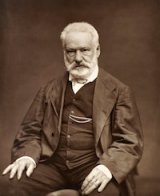Je respire où tu palpites
Victor Hugo 1802 (Besançon) – 1885 (Paris)
Je respire où tu palpites,
Tu sais ; à quoi bon, hélas !
Rester là si tu me quittes,
Et vivre si tu t’en vas ?
A quoi bon vivre, étant l’ombre
De cet ange qui s’enfuit ?
A quoi bon, sous le ciel sombre,
N’être plus que de la nuit ?
Je suis la fleur des murailles
Dont avril est le seul bien.
Il suffit que tu t’en ailles
Pour qu’il ne reste plus rien.
Tu m’entoures d’Auréoles ;
Te voir est mon seul souci.
Il suffit que tu t’envoles
Pour que je m’envole aussi.
Si tu pars, mon front se penche ;
Mon âme au ciel, son berceau,
Fuira, dans ta main blanche
Tu tiens ce sauvage oiseau.
Que veux-tu que je devienne
Si je n’entends plus ton pas ?
Est-ce ta vie ou la mienne
Qui s’en va ? Je ne sais pas.
Quand mon orage succombe,
J’en reprends dans ton coeur pur ;
Je suis comme la colombe
Qui vient boire au lac d’azur.
L’amour fait comprendre à l’âme
L’univers, salubre et béni ;
Et cette petite flamme
Seule éclaire l’infini
Sans toi, toute la nature
N’est plus qu’un cachot fermé,
Où je vais à l’aventure,
Pâle et n’étant plus aimé.
Sans toi, tout s’effeuille et tombe ;
L’ombre emplit mon noir sourcil ;
Une fête est une tombe,
La patrie est un exil.
Je t’implore et réclame ;
Ne fuis pas loin de mes maux,
Ô fauvette de mon âme
Qui chantes dans mes rameaux !
De quoi puis-je avoir envie,
De quoi puis-je avoir effroi,
Que ferai-je de la vie
Si tu n’es plus près de moi ?
Tu portes dans la lumière,
Tu portes dans les buissons,
Sur une aile ma prière,
Et sur l’autre mes chansons.
Que dirai-je aux champs que voile
L’inconsolable douleur ?
Que ferai-je de l’étoile ?
Que ferai-je de la fleur ?
Que dirai-je au bois morose
Qu’illuminait ta douceur ?
Que répondrai-je à la rose
Disant : « Où donc est ma soeur ? »
J’en mourrai ; fuis, si tu l’oses.
A quoi bon, jours révolus !
Regarder toutes ces choses
Qu’elle ne regarde plus ?
Que ferai-je de la lyre,
De la vertu, du destin ?
Hélas ! et, sans ton sourire,
Que ferai-je du matin ?
Que ferai-je, seul, farouche,
Sans toi, du jour et des cieux,
De mes baisers sans ta bouche,
Et de mes pleurs sans tes yeux !
Font size:
Submitted by fatmazayani on May 09, 2023
- 2:14 min read
- 19 Views
Quick analysis:
| Scheme | AAAA BCBC ADAD AAAA EAEA DADA FBFB FXFD BFBF FGFG FAFA HBHF BABA GBGB ABAB AAAA BXBD EAEA |
|---|---|
| Closest metre | Iambic tetrameter |
| Characters | 2,191 |
| Words | 448 |
| Stanzas | 18 |
| Stanza Lengths | 4, 4, 4, 4, 4, 4, 4, 4, 4, 4, 4, 4, 4, 4, 4, 4, 4, 4 |
Translation
Find a translation for this poem in other languages:
Select another language:
- - Select -
- 简体中文 (Chinese - Simplified)
- 繁體中文 (Chinese - Traditional)
- Español (Spanish)
- Esperanto (Esperanto)
- 日本語 (Japanese)
- Português (Portuguese)
- Deutsch (German)
- العربية (Arabic)
- Français (French)
- Русский (Russian)
- ಕನ್ನಡ (Kannada)
- 한국어 (Korean)
- עברית (Hebrew)
- Gaeilge (Irish)
- Українська (Ukrainian)
- اردو (Urdu)
- Magyar (Hungarian)
- मानक हिन्दी (Hindi)
- Indonesia (Indonesian)
- Italiano (Italian)
- தமிழ் (Tamil)
- Türkçe (Turkish)
- తెలుగు (Telugu)
- ภาษาไทย (Thai)
- Tiếng Việt (Vietnamese)
- Čeština (Czech)
- Polski (Polish)
- Bahasa Indonesia (Indonesian)
- Românește (Romanian)
- Nederlands (Dutch)
- Ελληνικά (Greek)
- Latinum (Latin)
- Svenska (Swedish)
- Dansk (Danish)
- Suomi (Finnish)
- فارسی (Persian)
- ייִדיש (Yiddish)
- հայերեն (Armenian)
- Norsk (Norwegian)
- English (English)
Citation
Use the citation below to add this poem to your bibliography:
Style:MLAChicagoAPA
"Je respire où tu palpites" Poetry.com. STANDS4 LLC, 2024. Web. 20 Apr. 2024. <https://www.poetry.com/poem/159031/je-respire-où-tu-palpites>.



Discuss the poem Je respire où tu palpites with the community...
Report Comment
We're doing our best to make sure our content is useful, accurate and safe.
If by any chance you spot an inappropriate comment while navigating through our website please use this form to let us know, and we'll take care of it shortly.
Attachment
You need to be logged in to favorite.
Log In